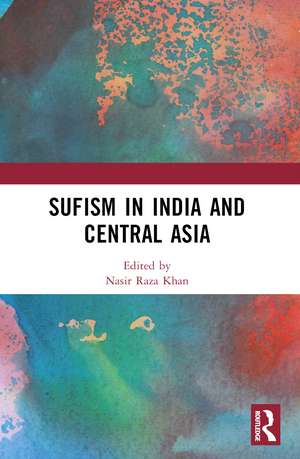Sufism in India and Central Asia
Editat de Nasir Raza Khanen Limba Engleză Paperback – 26 aug 2024
The people of these regions with different ethnic backgrounds, cultures and languages have been intermingling for many centuries, as seen in the cross-current exchanges of religious ideas and belief. The word Sufism, popularly known as mysticism is most likely derived from the Arabic word suf (meaning “wool”), more specifically it means “the person wearing ascetic woollen garments.” Sufism is deeply rooted in Islam and its development began in the late 7th and 8th centuries. The present volume is an attempt to look for answers to questions in relation to Sufism in India and Central Asia and to evaluate its relevance in the contemporary period. A group of distinguished scholars from India and Central Asia have contributed papers to this volume.
This volume will be useful to students and researchers working on social and cultural aspects of India and Central Asia.
| Toate formatele și edițiile | Preț | Express |
|---|---|---|
| Paperback (1) | 391.02 lei 43-57 zile | |
| Taylor & Francis – 26 aug 2024 | 391.02 lei 43-57 zile | |
| Hardback (1) | 897.86 lei 43-57 zile | |
| Taylor & Francis – 6 oct 2022 | 897.86 lei 43-57 zile |
Preț: 391.02 lei
Nou
Puncte Express: 587
Preț estimativ în valută:
74.82€ • 78.32$ • 62.28£
74.82€ • 78.32$ • 62.28£
Carte tipărită la comandă
Livrare economică 31 martie-14 aprilie
Preluare comenzi: 021 569.72.76
Specificații
ISBN-13: 9781032373591
ISBN-10: 1032373598
Pagini: 262
Ilustrații: 40
Dimensiuni: 156 x 234 mm
Greutate: 0.49 kg
Ediția:1
Editura: Taylor & Francis
Colecția Routledge
Locul publicării:Oxford, United Kingdom
ISBN-10: 1032373598
Pagini: 262
Ilustrații: 40
Dimensiuni: 156 x 234 mm
Greutate: 0.49 kg
Ediția:1
Editura: Taylor & Francis
Colecția Routledge
Locul publicării:Oxford, United Kingdom
Public țintă
AcademicCuprins
INDIA-CENTRAL ASIA: CULTURAL EXCHANGE 1. Introduction 2. Sufis in India and Central Asia During the Thirteenth and Fourteenth Century 3. Sufism: Cementing Bonds Between Central Asia and Kashmir 4. The Role of Sufis in Diplomatic Relations Between the Khoqand Khanate and India 5. Khwaja Badruddin Samarqandi: Founder of Firdausi Silsiah in India REGIONAL SUFI CENTRES AND THEIR INTER-CONNECTIONS 6. Sufis in Jammu and Their Cultural Impact 7. Kalimat al-Sadiqin: a Sufi Biographical Account 8. Central Asia to India: Immigration of Sufis and Urbanization in Medieval Rajasthan 9. Sufism in Bengal: Interactions and Impacts Through the Ages SUFI TRADITIONS IN CENTRAL ASIA AND CAUCASUS 10. Sufism and Religious Syncretism in the History of Central Asia 11. The Style of Persian Sufi Prose XI - XIII Centuries 12. Significance of Abd-ur-Rahman Jami’s Sufi-Poetic Discourse in the Literary Legacy of Medieval Persia 13. The Understanding of Self and Others in Teachings of Sufism by Najmuddin Razi (1177-1252) TEACHING OF SUFIS AND COMMUNAL HARMONY 14. Shaikh Sharfuddin Bu Ali Qalander Panipati’s Contribution for the Development of Composite Culture in Panipat During 14th Century 15. The Theme of Perfect Human in Sufism 16. Sufism in Karnataka: An Analysis of Shishunala Sharif
Notă biografică
Nasir Raza Khan (Ph.D.) is Hony. Director of India Arab Cultural Centre, Jamia Millia Islamia, New Delhi, India. He is former visiting professor of ICCR Chair of International Studies, Lebanese American University, Beirut, Lebanon, and former director of the Lal Bahadur Shastri Centre for Indian Culture, Embassy of India, Tashkent, Uzbekistan.
Descriere
Sufism in India and Central Asia is an attempt to put into perspective the relevance of Sufism – the concept and teaching, and to provide a realistic assessment of its role in India and Central Asia.
